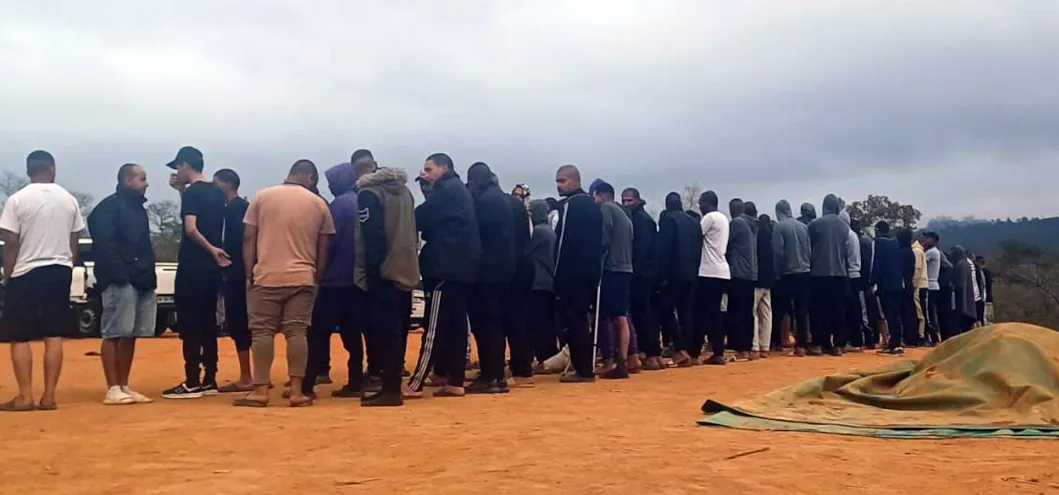It is widely believed in Libya that Khalifa Haftar, the military commander of Libya’s eastern forces, sent the 95 men to receive military training from a private company called Milites Dei in White River.
The 95 Libyan nationals who were arrested at a suspected military training camp at White River, Mpumalanga, have been deported to Benghazi in eastern Libya.
They returned to a country where another major military clash is looming between the United Nations-backed Government of National Unity based in Tripoli to the west and the rival government based in Benghazi and Tobruk in the east of the country.
It is widely believed in Libya that Khalifa Haftar, the military commander of the eastern forces, sent the 95 men to receive military training from a private company called Milites Dei in White River. The fact that they were deported to Benghazi reinforces this theory.
Libya is still divided between two governments, one based in Tripoli and a rival government based in Benghazi and Tobruk.
The Libyans were originally charged with falsifying their visa applications to come to South Africa. Later it was reported that they had been arrested for various other crimes, including rape and robbery.
But all charges were dropped when they appeared before the White River Magistrates’ Court on Thursday, 15 August. The court ruled they could be deported back to Libya.
On Sunday, the Department of Home Affairs said the Libyans were being deported and were “scheduled to leave South Africa from the Kruger Mpumalanga International Airport this morning in a flight that has been paid for by the Libyan government”.
Home Affairs spokesperson Siya Qoza later confirmed that the 95 had been flown to Benghazi. He did not respond to questions about which Libyan government had paid for the flight, and neither did Duwayne Esau, the spokesperson for Home Affairs Minister Leon Schreiber.
However, Tarek Megerisi, a Libya expert at the European Council on Foreign Relations (ECFR) told Daily Maverick, “I believe it is the eastern government of [Prime Minister] Osama Hammad that will have paid, though technically it comes from the same source (the central bank).”
Sliding back into civil war
The 95 fighters, who have received about four months of training in White River, returned to a country which Megerisi and other analysts believe may be sliding back into civil war.
“Over the past two months, the situation in Libya has deteriorated quite rapidly,” Stephanie Koury, deputy special representative for political affairs for Libya in the United Nations Support Mission in Libya, told the UN Security Council on Tuesday.
“The status quo is not sustainable. In the absence of renewed political talks leading to a unified government and elections, you see where this is heading: greater political, financial and security instability, entrenched political and territorial divisions, and greater domestic and regional instability.”
Koury said several unilateral acts by political, military and security actors had increased tensions and divisions and were complicating efforts to negotiate a political settlement.
One of those she cited was the march of Haftar’s (self-styled) Libyan National Army (LNA), led by his son Saddam, to the southwest of the country, into territory claimed by Tripoli. This prompted Libya’s western forces to mobilise and assert their readiness to respond to the LNA.
While the LNA later explained that it had moved to secure the southwestern border, its unilateral move caused tensions and also raised concerns from Algeria on the other side of that border, Koury said.
Khalifa Haftar led his LNA on a major offensive against Tripoli in April 2019 which was halted in the suburbs of the city in early 2020 only by the intervention of Turkish forces. An uneasy relative calm has prevailed since then, though tensions have persisted as efforts to unite the divided country have failed.
Megerisi told Daily Maverick: “I am deeply concerned that Libya is breaking down quite quickly. Over the past few weeks, the political bodies have all fractured and the competition between them has gotten more fractious. Armed forces are mobilised, with Haftar’s troops moving west. Algeria is on high alert, the largest oilfield is shut and the Haftars have made no secret that they’re planning to return to Tripoli.”
In a recent analysis for the ECFR, Megerisi wrote, “In recent weeks, Libya has been collapsing at every level. Increasing tensions between the ruling families, the Dabaibas and the Haftars, led Saddam Haftar to blockade Libya’s largest oilfield last week and later march his forces west, violating the 2020 ceasefire agreement.
“A few days later, the parliament, [in Tobruk] under the Haftars’ influence, officially unrecognised prime minister Abdul Hamid Dabaiba’s government and Libya’s Presidency Council [in the Tripoli government]. Then, on 18 August, the Presidency Council dismissed the long-standing central bank governor turned Haftar-ally Sadiq al-Kabir. This could be the final shock that sends Libya’s post-2020 status quo tumbling down into a civil war.”
He said Turkey and Russia had been increasing weapon deliveries and deepening their control over Dabaiba’s western and Haftar’s eastern armed forces, respectively.
Megerisi called for a holistic international intervention, “jump-starting Libya’s political process with enough political capital to redirect the interests of Libya’s myopic ruling class from their petty feuding”.
He urged the most active European states in Libya, including France, Germany, Italy and the United Kingdom to join the US and influential regional powers like Algeria, Egypt and Turkey to form an alliance to drive the political intervention.
This should include empowering Khoury to present an emergency plan for a new political process — including an election and negotiations with Libyan political heavyweights to frame their involvement in it.

